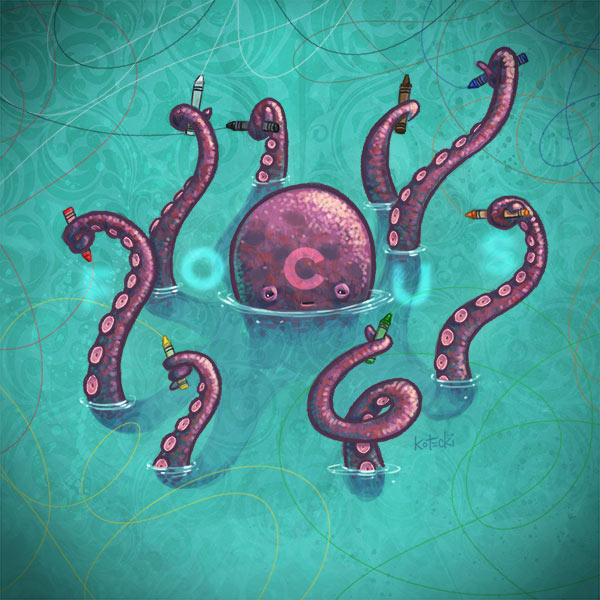
Today I’d like to talk about octopuses. Because it’s what we think we’re like when we multitask.
Yep, we imagine we’re like an octopus, one that’s holding a crayon with each arm, coloring eight different things simultaneously. Like a boss.
If only that were true.
If we are an octopus, we’re an octopus with only one arm, who colors one square inch of something, drops the crayon, picks up another, colors another square inch, drops that crayon, and on and on.
Research tells us that the human brain can only concentrate on one thing at a time. What we’re doing when we THINK we’re multitasking, is switching very quickly between two or more tasks. Which, studies also show, can temporarily reduce our IQ more than losing a night’s sleep or smoking marijuana.
Perhaps you already knew this. And yet we persist, all in the quest to get more done. Because life is happening so fast, it feels like we have to multitask just to keep up with everything.
Back in the day, it may have taken an entire hour for a woman to shell enough peas for her family’s dinner, while sitting on her rocking chair on the front porch. And yet she had time to soak in the smells of the lilac bush, engage in a meaningful conversation with a neighbor, and offer up some silent prayers for her friends and family.
Our ancestors could never dream about the technology we now take for granted. No question it makes us more productive. We can grab a can of peas from the pantry, pop the lid, and dump them into a bowl, in less time than it takes to say “Little House on The Prairie.”
The question is, what are we doing with all the extra time? More times than not, we are less like the old woman on the porch, and more like the headless chicken running around that her husband just drafted for dinner.
I am inspired by the idea of “slow parenting,” which I first heard about in an article from the Boston Globe by Jaci Conry.
“Loosely, slow parenting means no more rushing around physically and metaphorically, no more racing kids from soccer to violin to art class. Slow parenting cherishes quality over quantity, being in the moment, and making meaningful connections with your family.”
In the article, clinical psychologist John Duffy suggests that “parents just take time to watch their children, whether they are playing, doing homework, or eating a snack. Take a moment to drink them in. Remember and remind yourself how remarkable your children are. That pause alone, even if momentary, can drive a shift in the pace.”
I know I don’t do that nearly enough, but I am going to be doing it more. In fact, I think it’s a great recipe for more than just parenting. Perhaps there should be slow friendshipping, slow spousing, slow managing, and slow working as well.
We all want our lives to feel less fast. But there is no magic iPhone app or productivity hack that will magically make it so. No, the power to slow down is ours alone. We have to make a choice.
Quit pretending to be an octopus.
Turn your phone off during dinner. (Don’t just put in your purse or pocket.)
Dedicate 15 minutes a day to pray, meditate, or practice yoga.
Spend some time on the floor with your kid just doing what they want to do.
Actually use your vacation days, instead of saving them up for cash.
Or, buy some fresh peapods, and spend an hour shelling them on your front porch.
